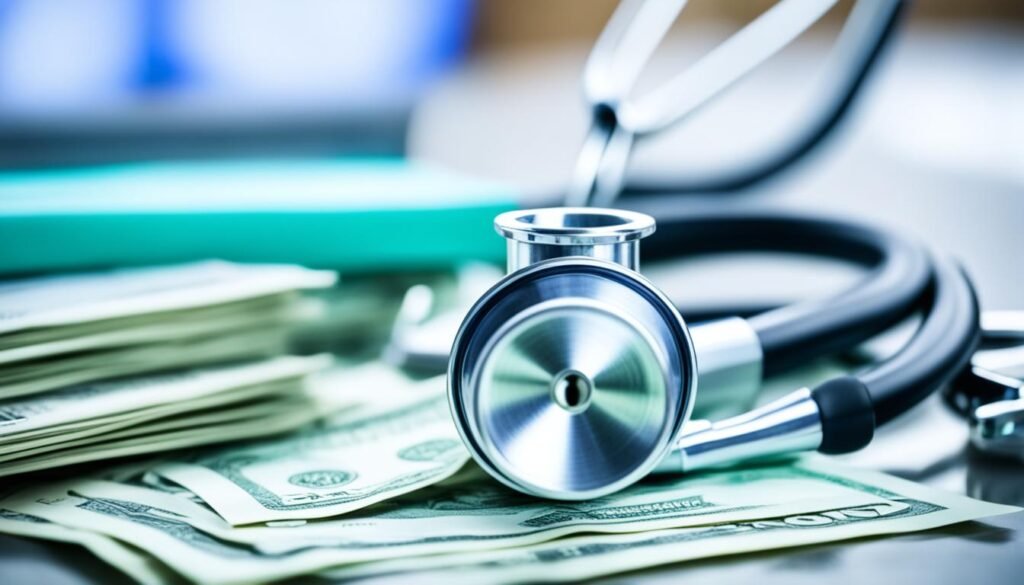medical Loan can drain your savings. Medical loans step in when insurance isn’t enough. They offer personal loans with lower interest rates than credit cards.
They also come with a fixed repayment term, making it easier to budget. Applying for one is easy, especially online. You can get the funds fast, often within days. But, if your credit score is low, you might not get the best rates. A KFF study found one in four Americans had trouble paying for health care recently. For those facing hefty medical expenses, a medical loan is a good option.
One big plus is the quick access to money, sometimes the next day. But, remember to think about the downsides too. In this article, we’ll look at medical loans closely. We’ll see how they work, where to find them, and discuss their pros and cons. This will help you make the best choice for your medical costs.
Key Takeaways : Medical Loan
- Medical loans can help cover uncovered medical expenses and avoid depleting your savings.
- These loans typically have fixed interest rates and repayment schedules, making budgeting more predictable.
- Bad credit borrowers may be eligible, but won’t get the lowest rates.
- Applying for a medical loan is often a straightforward online process.
- It’s important to weigh the pros and cons before taking out a medical loan.
Understanding Medical Loans
A medical loan lets you borrow money for medical expenses. You can use it for surgeries, IVF treatments, and emergencies. It’s great for costs not fully paid by insurance.
What is a Medical Loan?
A medical loan is money for your medical expenses. It’s quicker and has easier payback than regular loans. You can get them from online lenders, banks, or even healthcare providers.
Types of Medical Loans
Various medical loans exist, each with different rules. You can pick secured or unsecured based on your finances.
Secured vs. Unsecured Medical Loans
Secured medical loans need you to offer something valuable. It could be a home or car. You might get lower interest rates and can borrow more. But, losing your collateral is risk if you can’t pay back. Unsecured medical loans don’t need collateral. Yet, they might cost more and let you borrow less. If your credit is good, you might find better deals with unsecured loans.
Why Consider a Medical Loan?

Medical loans are a great way to finance sudden healthcare costs. They can cover costs not included in your insurance. This helps keep your savings safe. Many Americans face challenges paying for healthcare each year. Medical loans are there to support you when insurance isn’t enough. They offer quick funds without using up your emergency savings.
Cover Uncovered Medical Expenses
If your health insurance doesn’t cover certain treatments, medical loans can help. They pay for what your insurance doesn’t, easing your financial burden.
Avoid Depleting Savings
Taking out a medical loan spares your savings for real emergencies. These loans have set interest rates and repayment plans. This makes them better for you than credit cards with high interests.
Flexible Repayment Terms
Medical loans let you choose a comfortable payment plan. You pick the loan term that suits your budget, such as 12 or 24 months. Knowing your payments won’t change helps you stay focused on getting better.
How Do Medical Loans Work?

Getting a medical loan involves several steps. First, you can check what loan offers you might get without it affecting your credit score. After this, you can formally apply. This involves looking into your financial history and confirming your earnings.
Application Process
To apply, you can choose to visit a bank in-person or do it online. You’ll provide details like your credit history, how much you need to borrow, and what you plan to do with the money. Lenders use this info to decide if they can give you a loan. They also determine your interest rate and how you’ll pay back what you borrow.
Loan Approval and Funding
How long it takes for a lender to approve your loan can vary. But, you might find out in about a week. If you’re approved, the money can be in your account in a few days. This quick turnaround can be a big help with sudden medical expenses.
Repayment Terms
Once you have the money, you start paying it back each month. You’ll pay back the amount you borrowed plus interest. How much you pay back and your interest rate depend on different things, like your credit score. Some lenders might let you choose a payback plan that fits your budget better.
Where to Get a Medical Loan

If you need money for medical bills, there are many places to turn. You can look to online lenders, banks, credit unions, or even healthcare providers for a medical loan. Make sure to check more than just the interest rate. Look into who can apply, the loan’s details, and any extra fees.
Online Lenders
Getting a personal loan online is now a top choice for many. Places like , and Prosper offer medical loans. They make applying easy, fund quickly, and give good deals if you have good credit.
Banks and Credit Unions
Don’t forget about your local bank or credit union for a medical loan. While it might take more work to apply, you could get better service and lower interest rates if you have excellent credit. It’s smart to check with your bank or see what credit unions near you have to offer.
Healthcare Providers
Believe it or not, some healthcare providers offer financing too. They can make it easier to pay for things like cosmetic surgeries, dental work, or fertility treatments right there. But, compare their loan’s details with other options to make the best decision for you.
Always look closely at any medical loan before you choose it. Compare things like rates and terms from different places. This way, you can find the best deal to take care of your medical costs.
Pros and Cons of Medical Loans

Considering a medical loan for health bills? It’s smart to look at the good and not-so-good sides. While these personal loans are handy for paying off healthcare costs, they’re not perfect for everyone. We’ll check out the top pros and cons of medical loans.
Pros
The big plus of a medical loan? You know just how much you’re paying each month. With a steady interest rate and repayment term, budgeting is easier than with a credit card. Plus, medical loans often have lower interest rates, especially if your credit is good.
Getting the money is quick too. After loan approval, many lenders hand over the cash in just a few days. This fast access is great for urgent or unexpected medical needs.
The flexibility of a medical loan is a big benefit. You can use the money for all sorts of medical procedures. This includes things like dental work, vision care, and even cosmetic enhancements. It can also help pay for fertility treatments or other healthcare costs.
Cons
But, there are drawbacks. You’ll always pay interest, unlike some credit card deals with 0% APR to start. If your credit’s not great, you might end up with high interest rates. This can make a medical loan more expensive.
The loan amount might not cover all your needs. Some medical loans don’t give enough money for everything. This means you might need to find more money or pay some costs yourself.
Also, getting a medical loan means a hard credit check. This check can lower your credit score temporarily. It’s important to think about this if you have other big financial plans coming up soon.
Medical Loan for Different Purposes

Medical loans help pay for treatments not always covered by insurance. These include fertility treatments, cosmetic work, dental services, and eye surgeries. They let people pay over time with a fixed interest and monthly payment. This makes these procedures more affordable.
Fertility Treatments
In vitro fertilization (IVF) is costly but a dream for many couples. Medical loans make this dream reachable. They offer a way to cover fertility treatment costs with easy monthly payments. Such financial support reduces the stress of expenses during the process.
Cosmetic Procedures
Cosmetic treatments are elective but vital for some’s self-confidence. A medical loan can cover procedures like plastic surgery or aesthetic dentistry. They have lower interest rates than credit cards, making them easier to pay off.
Dental Expenses
Orthodontics, implants, and restorative dental work are often expensive. A medical loan aids in covering these costs. It ensures that necessary dental work doesn’t affect personal finances. It helps with anything from basic cleanings to big dental surgeries.
Vision Correction Surgeries
LASIK and similar surgeries can greatly improve your life but are pricey. A medical loan can make these treatments more affordable. It offers a fixed interest rate and payment plan. This way, borrowers can handle the cost over time.
Alternatives to Medical Loans
Medical loans can help with bills but might not be the best for everyone. There are other ways to handle big or surprise medical costs that could work better for you.
Payment Plans
If you’re struggling to pay all at once, ask if your doctor or hospital has a payment plan. This lets you spread the cost over months. Many plans don’t charge any extra fees, which is good for your budget. Just ask the healthcare team about your options.
Hospital Financial Assistance Programs
Did you know hospitals often have programs to help those who can’t afford their bills? If you’re facing hardship, they might offer discounts or erase what you owe completely. These programs look at how big your family is and your income. Checking for these programs could really help lower your costs.
Crowdfunding
you can share your story and ask for donations. Friends, family, and strangers can all pitch in. It’s not guaranteed to cover everything, but it can lighten the load without adding to your debts.
Credit Cards
Some prefer to use a credit card for smaller medical bills, especially with a 0% APR offer. But it’s important to pay it off before the deal ends to avoid extra charges. Using credit cards wisely is key, as they can pile up debt if you’re not careful.
Also Read : Best Low Interest Personal Loans – Affordable Options
FAQs
Q: What is a medical loan?
A: A medical loan is a personal loan that can be specifically used to cover medical expenses, such as medical treatments, procedures, or surgeries.
Q: How can I finance medical expenses with a medical loan?
A: You can apply for a medical loan from financial institutions or online lenders to help pay for your medical bills. These loans are unsecured personal loans that can be used exclusively for medical purposes.
Q: Can I get a medical loan with bad credit?
A: There are options for obtaining a medical loan with bad credit, although you may face higher interest rates or stricter credit requirements. Consider lenders who offer personal loans for individuals with poor credit.
Q: What are some loan options for financing medical expenses in 2024?
A: In 2024, some of the best medical loans include options from SoFi Personal, which offer competitive rates and terms suitable for medical financing needs.
Q: Do medical loans impact your credit score?
A: Yes, obtaining a medical loan can impact your credit score, as it involves a credit check and taking on additional debt. It’s important to make timely payments to avoid any negative effects on your credit report.
Q: What are the monthly payment options for medical loans?
A: Monthly payments for medical loans are typically fixed, meaning you will pay the same amount each month until the loan is fully repaid. It’s important to consider your budget and financial situation when choosing a payment plan.
Q: How do I apply for a medical loan?
A: To apply for a medical loan, you can typically fill out an online loan application with the lender of your choice. The process may involve a soft credit check to assess your creditworthiness.
Source Links
- https://www.discover.com/personal-loans/medical-expenses/
- https://www.bankrate.com/loans/personal-loans/medical-loans/
- https://www.td.com/us/en/personal-banking/personal-loan/personal-loan-for-medical-expenses
